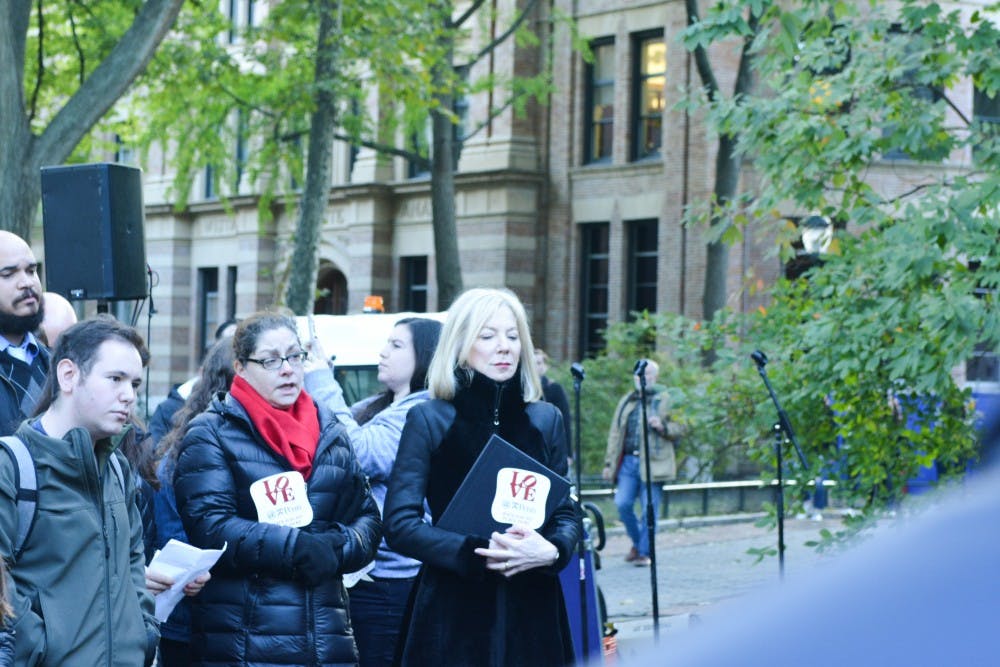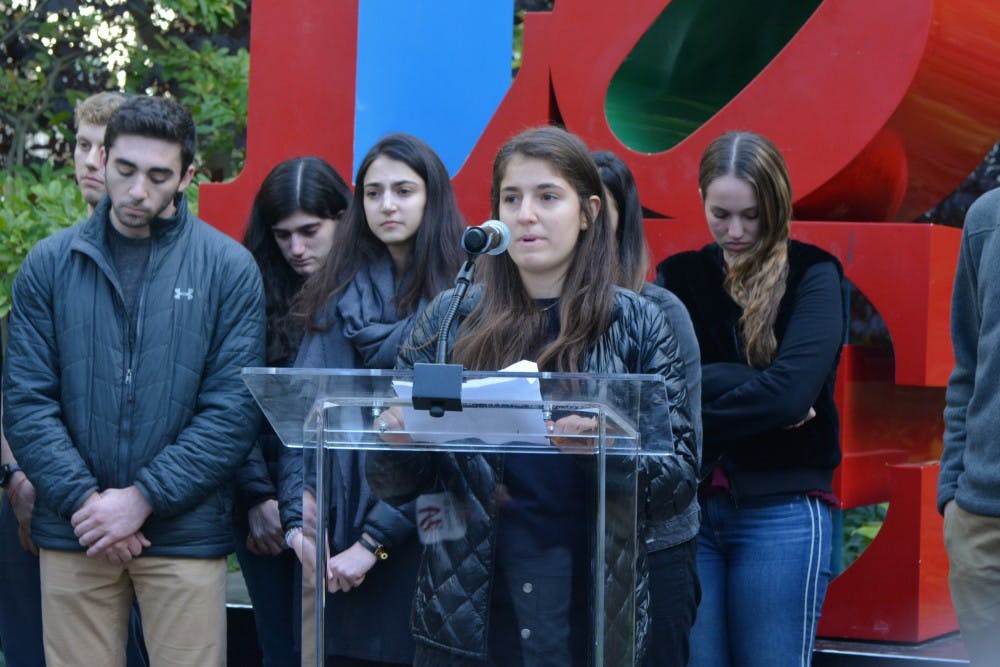Nearly a hundred members of the Penn community crowded together on College Green to honor the lives of the Pittsburgh synagogue shooting victims.
Overflowing onto Locust Walk, attendees filed onto the triangle of grass in front of the LOVE statue for the Penn Vigil for Pittsburgh at 4 p.m. on Monday, Oct. 29. Helmed by the leaders of Penn Hillel, the vigil hosted a series of speakers, including Penn President Amy Gutmann, and the Shabbatones — a Jewish a capella group — performed.
Hillel, the University Chaplain office, the Vice Provost for University Life office, and Chief of Wellness Officer Benoit Dubé co-hosted the event, said Hillel Senior Jewish Educator and Rabbi Joshua Bolton. Bolton was the first to address the crowd.
“We’re gathered this afternoon because even though there is nothing at all that can be said to comfort us, it is nevertheless good to come together,” Bolton said. “To be with one another, to share in sorrow, and to share in the confusion of this moment.”
On Oct. 27, a gunman opened fire at the Tree of Life synagogue in eastern Pittsburgh, leaving 11 dead and six wounded. The attack is said to be the deadliest attack against the American Jewish community in United States history. The suspect, Robert Bowers, later surrendered to the police and is expected to face hate crime charges.
Gutmann, the second speaker at the event, condemned the recent increase in anti-Semitic incidents throughout the United States. Gutmann was a first-generation college student, whose father fled Nazi Germany before the Holocaust.
“We are beset by rising anti-Semitism — make no mistake about it. Growing intolerance — make no mistake about it. Inexcusable vitriol from elected leaders, erosion of our values and the civil norms of a decent society,” Gutmann said to the crowd.

Penn President Amy Gutmann stands in solidarity at the vigil for victims of the Pittsburgh synagogue shooting.
Gutmann also spoke at length about Jerry Rabinowitz, a two-time Penn graduate. He was a 1973 College graduate, who went on to receive a degree from the Perelman School of Medicine in 1977, and was among those killed in the attack.
Gutmann detailed the alumnus’ life as a geriatric doctor who acted with extreme compassion in treating HIV positive patients at the height of the AIDS crisis and died while trying to help fellow members of the synagogue during the attack.
“It hit really close to home as a Jewish leader on this campus and as someone who has always found great community in the Jewish world,” said Samantha Brooks, Wharton senior and co-president of Hillel. “It just felt like it could have been my synagogue or my family’s synagogue, and it feels really personal.”
Jennifer Reiss, College senior and another co-president of Hillel, said the event was largely planned on Saturday and Sunday night after the end of Shabbat. Hillel collaborated with a number of groups across campus — both inside and outside of Penn’s Jewish community.

College senior and Hillel co-president Jennifer Reiss said the event was largely planned on Saturday and Sunday night after the end of Shabbat.
University Chaplain Rev. Charles Howard and College senior Aliya Farmanali, chair of the Programs for Religious, Interfaith, and Spiritual Matters — the University's student-led interfaith umbrella group — also spoke at the event, emphasizing their intention to support members of the Jewish community.
“Folks down the hall from you are weeping with you and more importantly, walking with you,” Howard said.
For Engineering senior Ross Schneider, the vigil was an important way to stand against hate and anti-Semitism.
“I think it’s important everywhere, but especially at Penn. A university is a place where ideas are supposed to spread and hopefully the good ideas win and the bad ones die out,” Schneider said.
For Nursing freshman Danielle Lo and Wharton freshman Emily Liao, the vigil was an opportunity to support friends who were closely affected by the tragedy.
“I don’t think I expected to become emotional,” Liao explained. “But everyone [at the vigil] felt like such a community and such a family.”
Before the vigil closed, Bolton encouraged students to reach out to one another and other campus organizations to seek comfort. Bolton also stated the names of the 11 killed in the shooting, while the crowd stood in silence and later invited people to join him in saying the Mourner’s Kaddish prayer.
“We have to continue taking into account, slowly, new realities that are now a part of the story of who we are, the story of who our families are, and the story of what it means to be a Jewish person in America in the 21st century,” Bolton said.
The Daily Pennsylvanian is an independent, student-run newspaper. Please consider making a donation to support the coverage that shapes the University. Your generosity ensures a future of strong journalism at Penn.
Donate





Most Read
Penn confirms five additional student visa revocations, bringing total to eight
Penn faculty criticize lack of University transparency after student visa revocations
Penn Medicine to take over two Crozer Health leases in $5 million deal amid system bankruptcy
More Like This